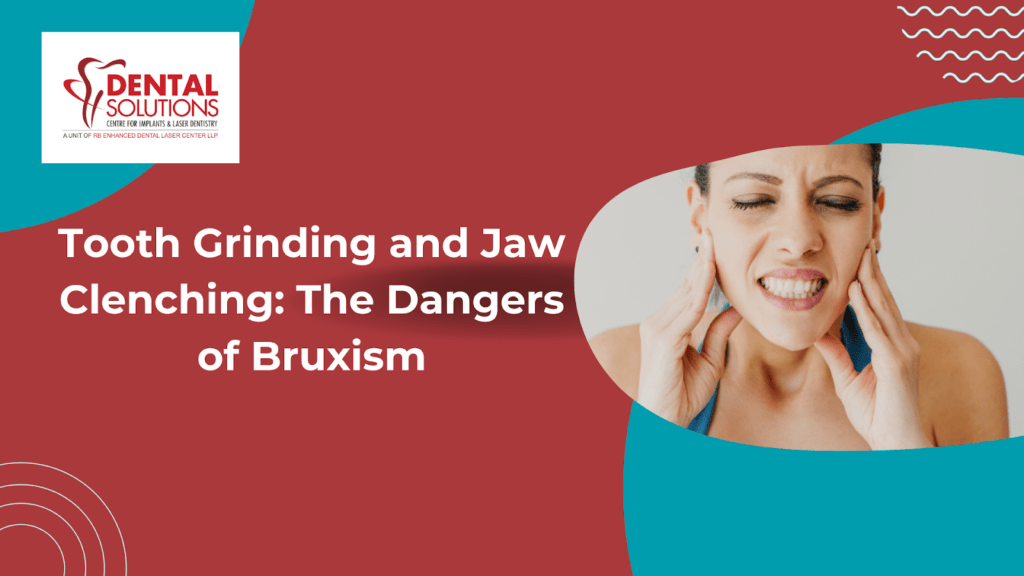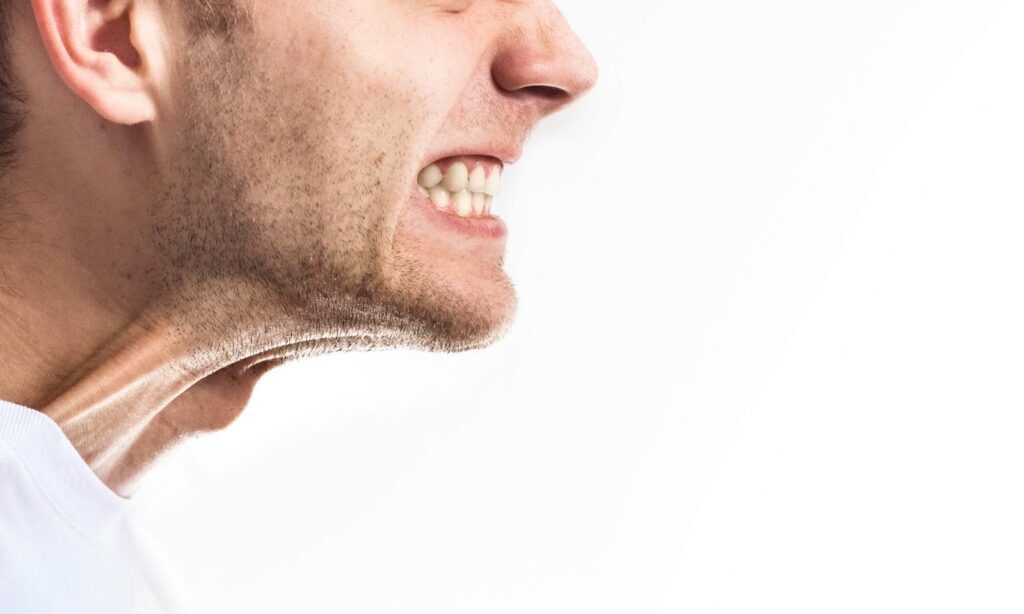- +917892951808
- Indiranagar, Bangalore
Best Dental Clinic In Bangalore Indiranagar | Best Dentist in Bangalore Indiranagar
- Home
- About Us
- Treatments
- Blog
- Contact Us
Tooth Grinding and Jaw Clenching: The Dangers of Bruxism

Introduction
General dentistry plays a crucial role in maintaining oral health and preventing various dental conditions. One such condition is bruxism, commonly known as teeth grinding or jaw clenching. Bruxism can lead to several harmful effects on the teeth, jaw muscles, and temporomandibular joints (TMJs). Here, we will delve into the different aspects of bruxism, including its types, harmful consequences, occurrence in children, risk factors, and prevalence. Additionally, we will explore the role of general dentistry in managing and treating bruxism effectively.
Types of Bruxism
Bruxism can occur during wakefulness or sleep, with each type having distinctive characteristics and potential consequences.
Awake Bruxism

Awake bruxism is characterized by clenching of the jaw and grinding of the teeth during the day. It is often associated with emotional issues such as anxiety, stress, anger, or intense concentration. People with awake bruxism can usually notice and control their teeth grinding, making treatment less necessary. Stress management techniques and increased self-awareness can help reduce the frequency of awake bruxism episodes.
Sleep Bruxism

Aesthetic Problems and Facial Profile Changes
Consistent teeth grinding can result in aesthetic issues, altering the appearance of the face and facial profile. Over time, bruxism can cause the teeth to become worn down, uneven, or fractured, leading to an undesirable smile.
TMJ and Muscular Damage
The temporomandibular joints (TMJs) connect the jawbone to the skull and play a crucial role in facilitating mouth movement. Bruxism can harm the TMJs and the surrounding jaw and neck muscles, causing pain, stiffness, and limited mobility. Prolonged untreated bruxism can lead to chronic TMJ disorders, which may require specialized treatment.
Tooth Fractures and Loosening

The excessive and repetitive grinding forces exerted during bruxism can result in tooth fractures and loosening. The constant pressure on the teeth weakens their structure, making them more susceptible to damage and potential tooth loss.
Teeth Wear and Tear
Another consequence of bruxism is the wearing down of the tooth enamel. The continuous grinding motion can erode the protective layer, exposing the inner layers of the teeth. This increased vulnerability can lead to increased tooth sensitivity, cavities, and other dental problems.
Bruxism in Children
Bruxism is not limited to adults; children can also experience teeth grinding. While bruxism in children may not cause long-term damage, it is essential to monitor and address the underlying causes and associated symptoms.
Factors Contributing to Bruxism in Children
Unlike adults, stress is not typically the primary cause of bruxism in children. Some factors that may contribute to teeth grinding in children include allergies, misaligned teeth, mouth irritation, obstructive sleep apnea, and heredity. Identifying the underlying cause is crucial in determining the most appropriate treatment approach.
Potential Consequences for Children
Children who grind their teeth may experience headaches, jaw pain, and TMJ disorders. Additionally, the consistent grinding can lead to wear and tear on their teeth, potentially affecting their oral health. Regular dental check-ups and prompt intervention are vital in managing bruxism in children effectively.
Identifying and Managing Bruxism
Recognizing the signs and symptoms of bruxism is the first step in managing and treating this condition effectively. If you or your child displays any indicators of teeth grinding, it is crucial to consult a healthcare provider or dentist for a comprehensive evaluation.
Signs and Symptoms
Some common signs of bruxism include:
- Audible grinding or clenching sounds during sleep
- Worn, flattened, or fractured teeth
- Jaw pain or stiffness
- Headaches, especially in the morning
- Facial pain or muscle tenderness
Seeking Professional Evaluation
If you suspect bruxism, it is essential to seek professional evaluation to determine the severity and underlying causes. A healthcare provider or dentist will conduct a thorough examination, which may include:
- Physical examination: The healthcare provider will examine your jaw, teeth, and surrounding muscles for signs of grinding and any associated damage.
- Dental history: Providing information about your oral hygiene routine, previous dental procedures, and any existing dental conditions can help in the diagnosis and treatment planning.
- Sleep history: For sleep bruxism, it may be necessary to evaluate your sleep patterns and any associated sleep disorders, such as sleep apnea.
Treatment Options
The treatment approach for bruxism depends on the severity, underlying causes, and associated symptoms. Some common treatment options include:
- Mouthguards or splints: Custom-fitted mouthguards or splints can help protect the teeth from grinding forces and alleviate jaw pain.
- Stress management techniques: If stress is a significant contributing factor, learning stress management techniques can help reduce the frequency and intensity of teeth-grinding episodes.
- Dental adjustments: In some cases, the dentist may recommend dental adjustments, such as reshaping or realigning the teeth, to minimize the effects of bruxism.
- Medications: In severe cases, medications such as muscle relaxants or Botox injections may be prescribed to alleviate muscle tension and reduce grinding.
Preventive Measures
While treatment options are available, preventing bruxism is always preferable. Incorporating the following preventive measures into your daily routine can help reduce the risk of developing bruxism:
- Maintain good oral hygiene practices, including regular brushing, flossing, and dental check-ups.
- Avoid excessive consumption of caffeine and tobacco products, as they can contribute to teeth grinding.
- Practice stress management techniques such as meditation, deep breathing exercises, or engaging in relaxation activities.
- Be mindful of clenching or grinding your teeth during the day, and consciously try to relax your jaw muscles.
General Dentistry in Bangalore: A Key Player in Bruxism Management
General dentists play a vital role in diagnosing, managing, and treating bruxism effectively. In Bangalore, a city known for its advanced dental care facilities, several dental clinics and practitioners specialize in bruxism management. A visit to a general dentist in Bangalore can provide you with expert guidance and personalized treatment options tailored to your specific needs.
Importance of Regular Dental Check-ups
Regular dental check-ups are crucial in identifying and managing bruxism at an early stage. During these check-ups, the dentist will assess your oral health, screen for signs of teeth grinding, and provide appropriate interventions to prevent further damage.
Treatment and Management Approaches
Best Dentists in Indiranagar, Bangalore offer a range of treatment and management approaches for bruxism, including:
- Custom-fitted mouthguards: General dentists can create customized mouthguards or splints to protect the teeth during sleep and minimize the grinding forces.
- Dental adjustments: If necessary, the dentist may recommend dental adjustments to correct misaligned teeth or reshape the biting surfaces, reducing the effects of bruxism.
- Patient education: General dentists in Bangalore are well-equipped to educate patients about bruxism, its causes, and preventive measures. They can provide personalized advice on stress management, oral hygiene, and lifestyle modifications to minimize the impact of teeth grinding.
Conclusion
Bruxism, or teeth grinding, can have detrimental effects on oral health and overall well-being. Understanding the types, harmful consequences, occurrence in children, risk factors, and prevalence of bruxism is essential in seeking timely treatment and preventive measures. General dentistry in Bangalore plays a crucial role in managing and treating bruxism effectively, offering personalized interventions and expert guidance. By prioritizing regular dental check-ups and adopting preventive measures, individuals can safeguard their oral health and minimize the impact of bruxism on their daily lives.
